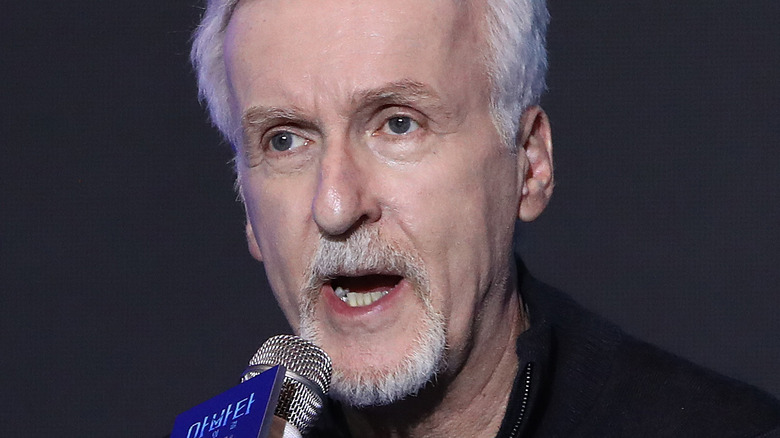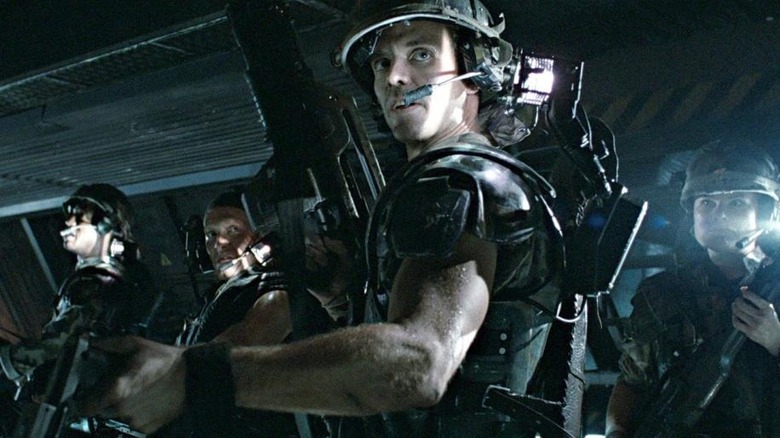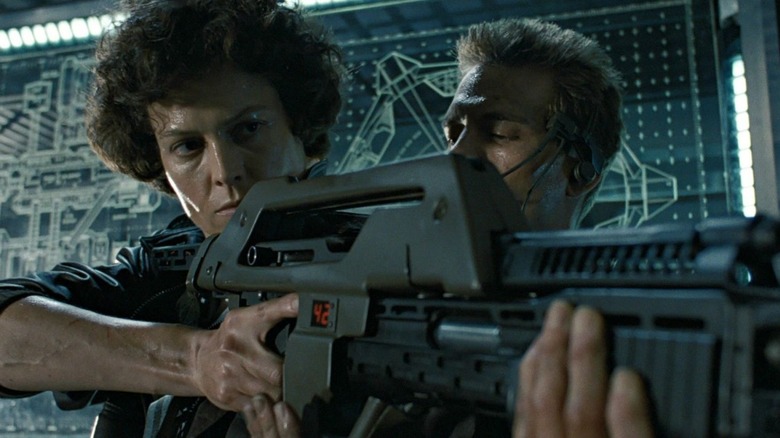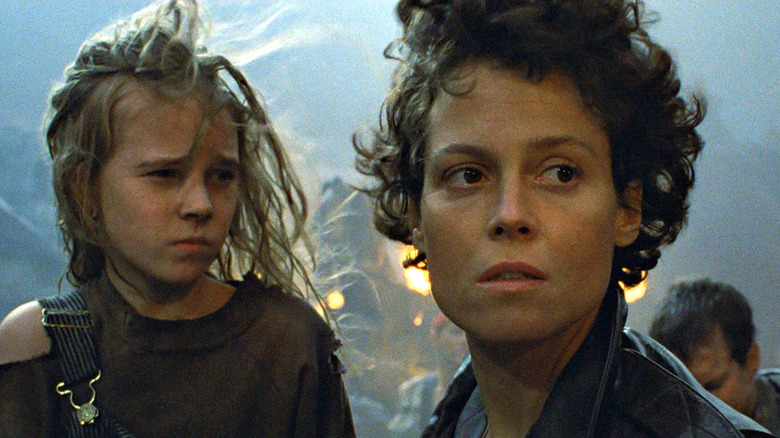James Cameron Is The King Of Sequels, But One Follow-Up Stands Above The Rest
Put James Cameron's movies on shuffle (while maybe excluding "Piranha Part Two: The Spawning"), and chances are you're in for a good time. That's what you get when you're watching a film from a director responsible for two of the biggest box-office films of all time. The real trick is settling on which of his four sequel movies is the best of the bunch. They all burst with originality in their own ways concerning special effects and just sheer bombast, but M41A Pulse Rifle to your head, which one are you going to pick? It's a conversation that will be wrought with the same intensity as the debate of "A New Hope" vs. "The Empire Strikes Back," "Infinity War" vs. "Endgame," or "The Godfather" vs. "The Godfather Part II."
There's every chance some fans may believe that his eagerly anticipated CGI fest "Avatar: The Way of Water" could end up being Cameron's best follow-up film. That being said, there's a pair that, in their own right, changed cinema forever and even won Oscars for their trouble. But while many might lean toward the one that has a killer cop and an action hero making a comeback, the truth is that Cameron's daring venture to a universe that wasn't his own is the best he's ever done.
Aliens is James Cameron's best sequel because it's not his world
The history behind James Cameron's journey to giving us another close encounter with H.R. Giger's grotesque but perfect organism is as iconic as the film itself. There's the age-old tale of him writing a dollar sign at the end of "Alien" (via CinemaBlend). He was also met with tension by the film crew that had worked on Ridley Scott's movie and didn't believe in this Canadian up-and-comer with plans for Ellen Ripley (Sigourney Weaver). This is one of the core reasons that in the battle for the best sequel under Cameron's watch, "Aliens" is actually stronger than "Terminator 2: Judgment Day."
Hands up, though. There's no doubt that "Terminator 2: Judgment Day" isn't just one of Cameron's better movies but one of the greatest ever made. The groundbreaking director returned to the world that kicked his career into gear and did so with a bucketload of liquid metal and Arnold Schwarzenegger in his prime. In that 1991 film, Cameron was back expanding the playground he originally built and having Robert Patrick's fluid antagonist drive a truck through proceedings. Without a doubt, "Judgment Day" is still the smash it is today because it's Cameron's world; we're just inhaling popcorn in it. Of course, working off a blueprint you built the foundations of is easy. Taking someone else's and running with it is a different thing, which is precisely why it's not just a more significant film but a far more impressive accomplishment.
With James Cameron's Aliens, this time, it's more
To many, Ridley Scott's "Alien" is a masterpiece and a film that can't be matched. It's fitting, then, that "Aliens" doesn't play the original at its own game but changes it considerably. If Scott's film is a haunted house in space, James Cameron's is a ghost train, a theme park ride like so many of his films pulling us in every direction after dragging us back to the source and skirting over established rules the first film set up. By making bursting chests an afterthought in both a nightmare sequence and the demise of an unfortunate colonist, Cameron wiped the bloody slate clean. He led us down a dark path and still managed to fool us thanks to the advanced firepower he was packing.
"Aliens" might feel like an action film, but the terror chimes in with every beep on the scanner, initially building up and then breaking down what we think might change the tide this time around for Ripley. Along with James Horner's epic score and shots of Corporal Dwayne Hicks (Michael Biehn), Private Hudson (Bill Paxton), and company tooling up for another bug hunt, it hints that there might be a chance that a fight for survival would end in victory for all. Of course, that isn't the case, and Ripley became a template Cameron would apply in future projects that franchises to this day are unable to replicate.
Ripley's trauma prepared James Cameron for Sarah Connor's in Judgment Day
It's funny that with the recent "Halloween" revival, a new trilogy supposedly focusing on trauma didn't take notes from a classic franchise chapter that is still leagues ahead of most nowadays. Sigourney Weaver even earned an Oscar nomination for her performance in a rare horror nod from the Academy. Ripley's recovery in accepting that the nightmare she blew out of the airlock is alive, well, and multiplied is a journey that few other horror franchises have tried to follow and succeeded in. With James Cameron, though, it's something he replicated when it came to making a sequel to his own franchise and a badass with her own personal battles.
The similarities between Sarah Connor (Linda Hamilton) in "Terminator 2: Judgment Day" and Ripley in "Aliens" stretch beyond the tough female protagonist calling the shots and taking some too. Both fear a threat on the edge of everyone else's understanding, with the only ones sharing the dread being children knowing what danger is hiding around the corner. They even have the same trust issues with artificial persons. Sure, "The Terminator" might predate Cameron's trip into the world of acid-spitting beasties, but the interplanetary interval between it and "Judgment Day" proved a huge help. You can believe "Judgment Day" is the better sequel, but in the end, by daring to take on "Aliens," it wouldn't have even been marked on the calendar.



